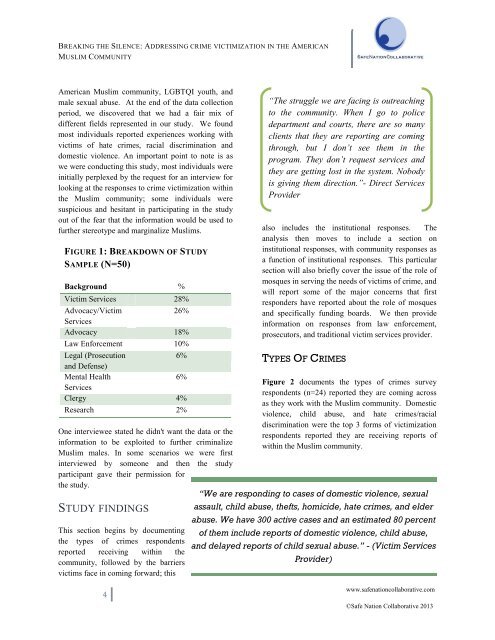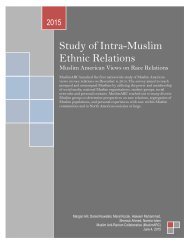Breaking-the-Silence
Breaking-the-Silence
Breaking-the-Silence
You also want an ePaper? Increase the reach of your titles
YUMPU automatically turns print PDFs into web optimized ePapers that Google loves.
BREAKING THE SILENCE: ADDRESSING CRIME VICTIMIZATION IN THE AMERICAN<br />
MUSLIM COMMUNITY<br />
American Muslim community, LGBTQI youth, and<br />
male sexual abuse. At <strong>the</strong> end of <strong>the</strong> data collection<br />
period, we discovered that we had a fair mix of<br />
different fields represented in our study. We found<br />
most individuals reported experiences working with<br />
victims of hate crimes, racial discrimination and<br />
domestic violence. An important point to note is as<br />
we were conducting this study, most individuals were<br />
initially perplexed by <strong>the</strong> request for an interview for<br />
looking at <strong>the</strong> responses to crime victimization within<br />
<strong>the</strong> Muslim community; some individuals were<br />
suspicious and hesitant in participating in <strong>the</strong> study<br />
out of <strong>the</strong> fear that <strong>the</strong> information would be used to<br />
fur<strong>the</strong>r stereotype and marginalize Muslims.<br />
FIGURE 1: BREAKDOWN OF STUDY<br />
SAMPLE (N=50)<br />
Background %<br />
Victim Services 28%<br />
Advocacy/Victim<br />
26%<br />
Services<br />
Advocacy 18%<br />
Law Enforcement 10%<br />
Legal (Prosecution<br />
6%<br />
and Defense)<br />
Mental Health<br />
6%<br />
Services<br />
Clergy 4%<br />
Research 2%<br />
One interviewee stated he didn't want <strong>the</strong> data or <strong>the</strong><br />
information to be exploited to fur<strong>the</strong>r criminalize<br />
Muslim males. In some scenarios we were first<br />
interviewed by someone and <strong>the</strong>n <strong>the</strong> study<br />
participant gave <strong>the</strong>ir permission for<br />
<strong>the</strong> study.<br />
STUDY FINDINGS<br />
This section begins by documenting<br />
<strong>the</strong> types of crimes respondents<br />
reported receiving within <strong>the</strong><br />
community, followed by <strong>the</strong> barriers<br />
victims face in coming forward; this<br />
“The struggle we are facing is outreaching<br />
to <strong>the</strong> community. When I go to police<br />
department and courts, <strong>the</strong>re are so many<br />
clients that <strong>the</strong>y are reporting are coming<br />
through, but I don’t see <strong>the</strong>m in <strong>the</strong><br />
program. They don’t request services and<br />
<strong>the</strong>y are getting lost in <strong>the</strong> system. Nobody<br />
is giving <strong>the</strong>m direction.”- Direct Services<br />
Provider<br />
also includes <strong>the</strong> institutional responses. The<br />
analysis <strong>the</strong>n moves to include a section on<br />
institutional responses, with community responses as<br />
a function of institutional responses. This particular<br />
section will also briefly cover <strong>the</strong> issue of <strong>the</strong> role of<br />
mosques in serving <strong>the</strong> needs of victims of crime, and<br />
will report some of <strong>the</strong> major concerns that first<br />
responders have reported about <strong>the</strong> role of mosques<br />
and specifically funding boards. We <strong>the</strong>n provide<br />
information on responses from law enforcement,<br />
prosecutors, and traditional victim services provider.<br />
TYPES OF CRIMES<br />
Figure 2 documents <strong>the</strong> types of crimes survey<br />
respondents (n=24) reported <strong>the</strong>y are coming across<br />
as <strong>the</strong>y work with <strong>the</strong> Muslim community. Domestic<br />
violence, child abuse, and hate crimes/racial<br />
discrimination were <strong>the</strong> top 3 forms of victimization<br />
respondents reported <strong>the</strong>y are receiving reports of<br />
within <strong>the</strong> Muslim community.<br />
“We are responding to cases of domestic violence, sexual<br />
assault, child abuse, <strong>the</strong>fts, homicide, hate crimes, and elder<br />
abuse. We have 300 active cases and an estimated 80 percent<br />
of <strong>the</strong>m include reports of domestic violence, child abuse,<br />
and delayed reports of child sexual abuse.” - (Victim Services<br />
Provider)<br />
4<br />
www.safenationcollaborative.com<br />
©Safe Nation Collaborative 2013



